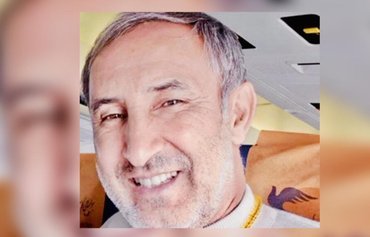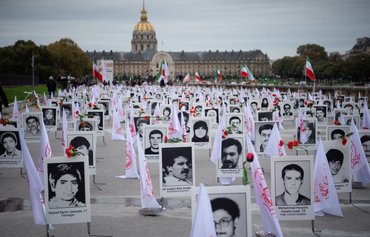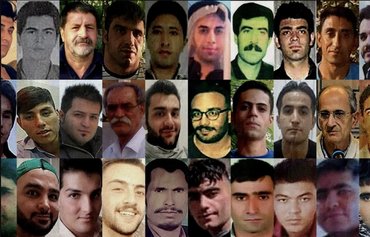STOCKHOLM -- A Swedish court on Thursday (July 14) handed a life sentence to former Iranian prison official Hamid Noury for crimes committed during a 1988 purge of dissidents, in the first trial related to the mass executions.
Noury, 61, was convicted of a "serious crime against international law" and "murder", the Stockholm district court said in a statement.
His lawyer said he will appeal the verdict.
Last July, Swedish prosecutors charged Noury with "war crimes and murder" in connection with the execution of more than 100 political prisoners in 1988 in Iran.
![In this file photo taken November 23, people demonstrate outside the Stockholm District Court in connection with the war crime trial of Iranian national Hamid Noury. [Duygu Getiren/TT News Agency/AFP]](/cnmi_am/images/2022/07/15/36240-sweden-court-demonstration-600_384.jpg)
In this file photo taken November 23, people demonstrate outside the Stockholm District Court in connection with the war crime trial of Iranian national Hamid Noury. [Duygu Getiren/TT News Agency/AFP]
![This courtroom sketch made on November 23 by Anders Humlebo shows former Iranian prison official Hamid Noury (left) and attorney Thomas Soderqvist during the war crime trial of Noury in Sweden. [Anders Humlebo/TT News Agency/AFP]](/cnmi_am/images/2022/07/15/36242-Hamid-Noury-trial-600_384.jpg)
This courtroom sketch made on November 23 by Anders Humlebo shows former Iranian prison official Hamid Noury (left) and attorney Thomas Soderqvist during the war crime trial of Noury in Sweden. [Anders Humlebo/TT News Agency/AFP]
The mass executions were decided by a group later known as the "death commission", in which Iranian president Ebrahim Raisi had a key role.
Raisi, referred to as a mass murderer by several global rights groups, is widely known as being a main decision-maker in the mass executions of 1988.
In the summer of that year, Iran's then-leader Rouhollah Khomeini issued an order to execute all inmates held in Iranian prisons who sympathised with, or were loyal to, the People's Mojahedin of Iran (internationally known as MEK) or Marxists.
The "death commission" is thought to have sent at least 5,000 to be executed.
The MEK puts the figure as high as 30,000 victims.
The majority of political prisoners the Iranian regime sentenced to death in 1988 were members of the MEK, along with a number of alleged Marxists.
Amnesty International and multiple other human rights organisations have described the mass killings as a crime against humanity.
The bodies of those executed were not turned over to their families, nor was the location of their burial disclosed to them.
An important conviction
According to the court, Noury was an assistant prosecutor in a prison near Tehran at the time of the events.
"The investigation has shown that the accused, jointly and in collusion with others, participated in the commission of the criminal acts," the court said.
It said he "retrieved prisoners, brought them to the committee and escorted them to the execution site".
Noury was sentenced both for his role in the killings targeting the MEK and for participating in a second wave directed at "left-wing sympathisers who were deemed to have renounced their Islamic faith", the court said.
The charge of "a serious crime against international law" related to the first wave and the "murder" charge related to the second.
"It feels very, very important that we have a conviction today," said public prosecutor Martina Winslow, noting that the crimes dated back decades.
"There is no one that has been convicted anywhere in the world for participating in these mass executions."
Decision against 'whole regime'
Noury was arrested at a Stockholm airport in November 2019 after Iranian dissidents in Sweden filed police complaints against him.
"This is a historic day, both for Sweden and Iranians that have fought for democracy," said Mehri Emrani, a 61-year-old MEK supporter who served time in prison herself and whose husband was a plaintiff.
"This is not only against Hamid Noury; this decision is against the whole regime in Iran," said Kenneth Lewis, a lawyer for the plaintiffs.
The trial has rendered Stockholm's already chilly relations with Tehran even frostier.
This is partly because rights activists accuse senior Iranian officials now in power -- including Raisi -- of having been members of the "death commission" committees that handed down the death sentences.
Raisi has denied ever having been part of these committees.
Tehran has repeatedly called on the Swedish government for Noury's release.
In January, former senior United Nations (UN) officials and Nobel prize winners urged the UN human rights office to launch a probe into the mass executions.
The open letter urging the UN to investigate the executions names Raisi and judiciary chief Gholam-Hossein Mohseni-Ejei among the alleged perpetrators, who "continue to enjoy impunity".
"Thousands of political prisoners who refused to abandon their beliefs were executed. The victims were buried in mass graves scattered throughout the country," the letter said.
Executions in Iran rose by 25% in 2021, according to an April 28 report by two leading NGOs, who expressed alarm over a surge in the numbers executed for drug offences and the hanging of women and members of ethnic minorities.
The rate of executions in Iran accelerated after Raisi took office, said the report by Norway-based Iran Human Rights (IHR) and France's Together Against the Death Penalty (ECPM).

![People react outside Stockholm District Court in Sweden on July 14, after the life sentence in the war crime trial of Hamid Noury was spoken. [Chris Anderson/TT News Agency/AFP]](/cnmi_am/images/2022/07/15/36238-sweden-iran-verdict-600_384.jpg)






